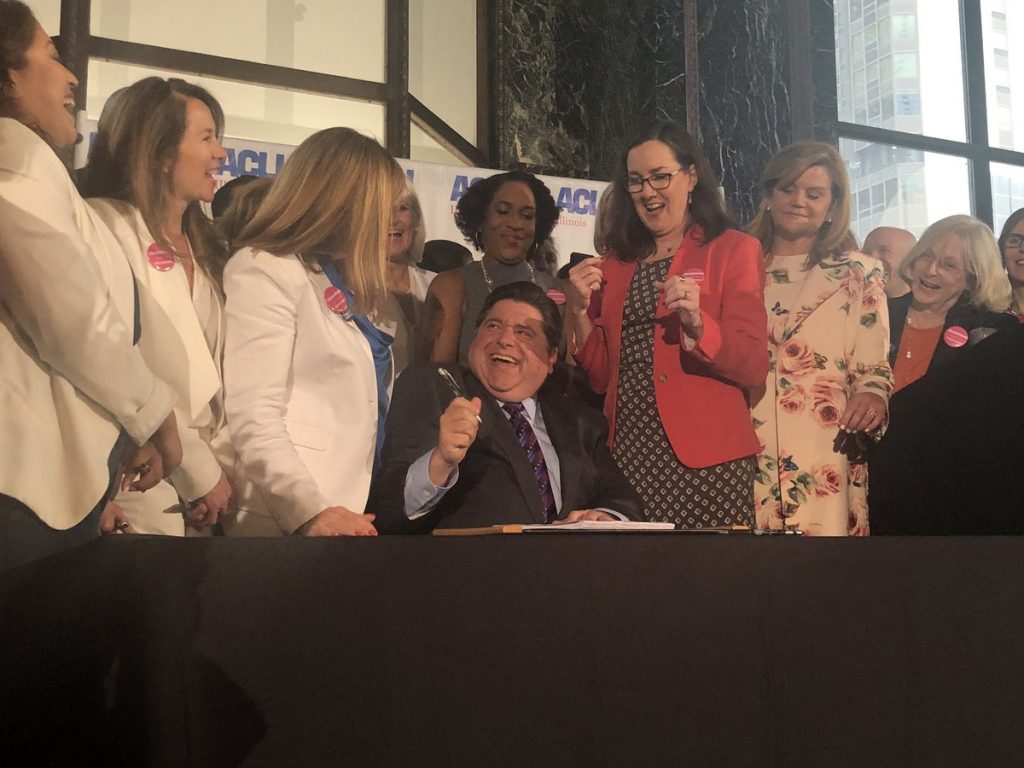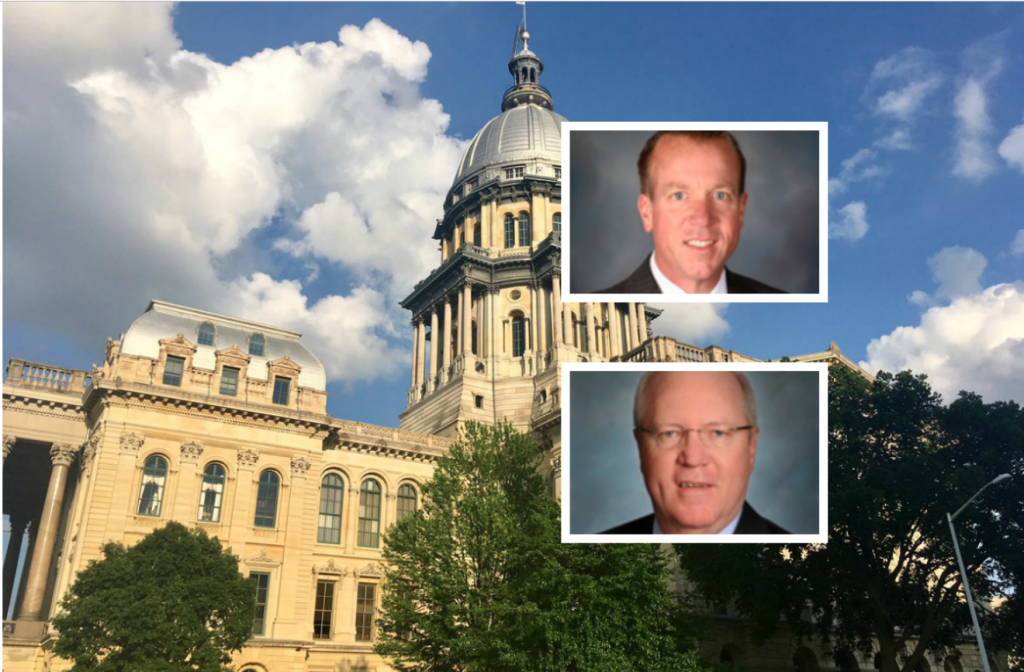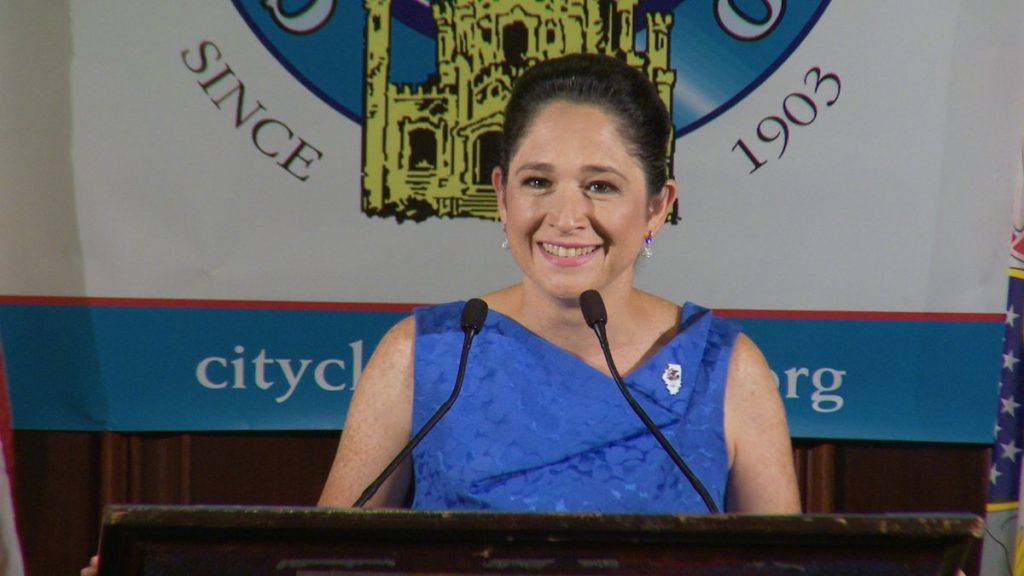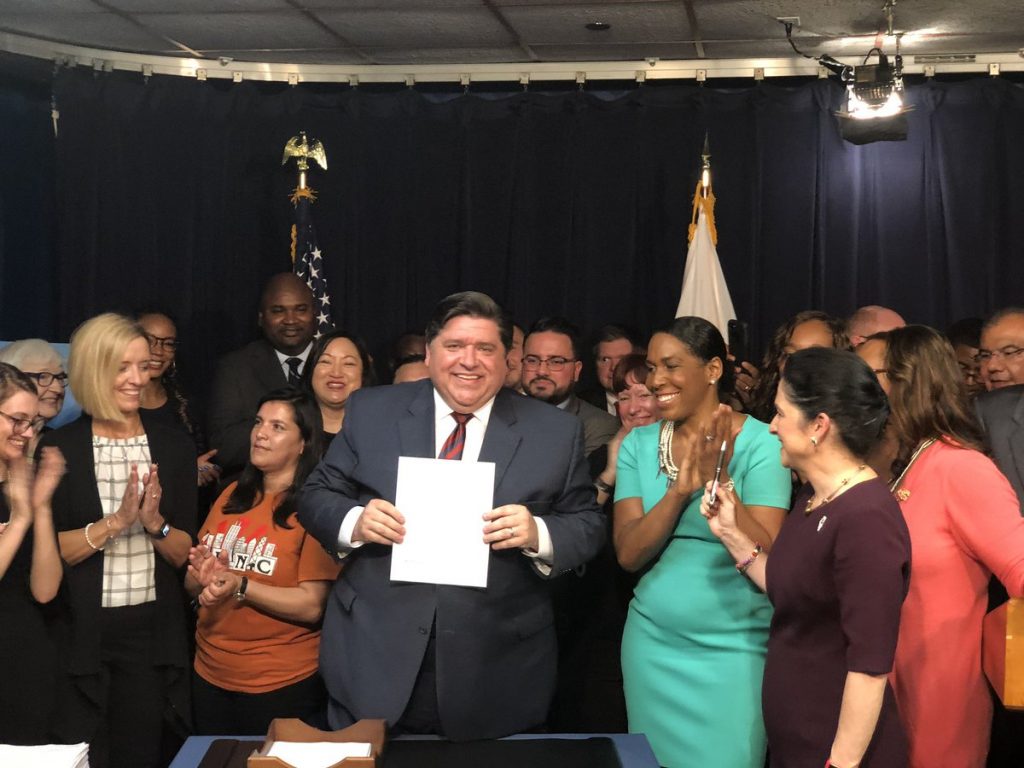Springfield News
-
Lovers of fizzy water who got their LaCroix fix at Walgreens only to be incorrectly hit with the Chicago’s bottled water tax — which does not apply to sparkling water and seltzer — can not sue the drug store for fraud, the Illinois Supreme Court ruled.
 A DNAinfo investigation found Walgreens erroneously taxed sparkling water. [DNAinfo Chicago]
A DNAinfo investigation found Walgreens erroneously taxed sparkling water. [DNAinfo Chicago]
The Illinois Supreme Court ruled 6-1 to reject a class action suit brought by Destin McIntosh, who filed suit after he bought sparkling water from a Chicago Walgreens store only to find he had paid Chicago’s five-cent per bottle tax, which should have applied only to plain, bottled water.
The taxing error was first reported by DNAinfo Chicago, which is now Block Club Chicago.
Walgreens corrected the error after the news reports.
The decision authored by Supreme Court Justice P. Scott Neville found Walgreens acted in good faith because officials believed the tax was required, did not attempt to hide the charge from customers and paid the tax to the city.
Chief Justice Lloyd A. Karmeier, and justices Rita B. Garman, Robert R. Thomas, Anne Burke and Mary Jane Theis concurred.
Read the full decision here.
However, dissenting Justice Thomas L. Kilbride said the ruling could establish a precedent that could thwart future consumer fraud claims by relying on the so-called “voluntary payment doctrine.”
That doctrine prevents litigants from recovering payments that were not coerced and if the charge was disclosed.
The suit was originally dismissed by a Cook County judge, but revived by an appeals court. Attorneys for Walgreens appealed that decision to revive the lawsuit. -
Organized labor helped push the bill to legalize recreational marijuana across the finish line in the closing days of the spring legislative session last month, but unions’ involvement in the marijuana industry is likely only just budding.
 Unions like the International Union of Operating Engineers Local 399 and Teamsters Joint Council 25 could also represent workers supporting the infrastructure of the recreational marijuana industry. [Twitter/@jake____lewis]
Unions like the International Union of Operating Engineers Local 399 and Teamsters Joint Council 25 could also represent workers supporting the infrastructure of the recreational marijuana industry. [Twitter/@jake____lewis]
-
Chicago and the rest of Illinois have lost population in recent years, partly because of a lack of economic and housing opportunities for black residents and, broadly, the loss of manufacturing jobs. [The Pew Charitable Trusts]
It’s known here as The Exodus.
People are leaving Illinois in droves. Republicans blame the state’s high taxes and its unfunded pension liability, which tops $130 billion. Democrats believe it’s the state’s lack of investment in education and infrastructure. -
The Spring legislative session may have ended without so much as a hearing on a bill that would allow nurse anesthetists to administer anesthesia without a physician’s direct supervision, but that hasn’t stopped a full-blown coalition from forming against the bill as insurance for possible action during veto session or even next year.
-
Gov. JB Pritzker signed the Reproductive Health Act into law Wednesday, touting the measure as “a giant step forward for women’s health.”
 Gov. JB Pritzker celebrates while signing the Reproductive Health Act into law, while State Rep. Kelly Cassidy, D-Chicago, cheers. [Governor's office]
Gov. JB Pritzker celebrates while signing the Reproductive Health Act into law, while State Rep. Kelly Cassidy, D-Chicago, cheers. [Governor's office]
The new law makes Illinois one of most progressive states in the nation when it comes to abortion. It repeals of the state’s 1975 abortion law, removes criminal penalties for doctors who perform abortions and throws out restrictions on the procedure later in pregnancy.
It also marks the second time in recent years that Illinois lawmakers have expanded abortion rights. In 2017, former Gov. Bruce Rauner signed a bill that will ensure abortion remains legal in Illinois even if Roe v. Wade is overturned by the U.S. Supreme Court, and allowed the use of taxpayer funds for abortion care.
But even with the Reproductive Health Act, SB 25, now law, it isn’t the last abortion-related fight on the horizon.
Shortly before the governor signed at the Chicago Cultural Center Wednesday morning, Personal PAC Board President Melissa Widen said the next step for reproductive rights activists is the repeal of Illinois’ 1995 Parental Notice of Abortion Act
“Now I look forward to working with the governor and our pro-choice leaders in the Senate and the House to pass the next important bill, and that’s to repeal the dangerous parental notice of abortion law,” Widen said.
Related: Dems to push for repeal criminalization of abortion doctors, parental notice laws
Both the RHA and the bill to repeal the parental notice law were introduced around the same time in February, after having been included in recommendations from gubernatorial transition committee reports early in Pritzker’s term. But both bills faced roadblocks in March, when House Democratic leadership shelved the bills, sending them to a subcommittee to die a quiet death.
Related: Dem lawmakers vow to hold Pritzker to his promise to expand, protect reproductive rights
But in the wake of the passage and signing of abortion bans and so-called “heartbeat bills” that aim to curtail abortion access in states like Alabama, Georgia, Missouri, Kentucky and Tennessee this spring, newly elected Democratic women, many of whom campaigned for the General Assembly on a platform that included abortion rights, pushed for the RHA.
Related: Advocates frustrated as push to expand, protect reproductive rights stalls
Toward the end of session, House Democrats held a lengthy caucus meeting, after which RHA sponsor State Rep. Kelly Cassidy (D-Chicago) confirmed to reporters that the brick was coming off her bill. The Sunday before the end of spring legislative session, bill language for the RHA was finally attached to a vehicle bill, and after a marathon hearing and two emotional debates in the last week of session, the bill passed both chambers.
Cassidy told The Daily Line that the plan had been to move the RHA first, and then to move the bill repealing the Parental Notice of Abortion Act. But she said the most simple explanation was that lawmakers “ran out of time.” Though the repeal of the parental notice law could have been rolled into a larger RHA bill, Cassidy said not doing so was a conscious choice.
“That was a strategic decision made with the coalition,” Cassidy said. “The RHA contains firewall provisions, if you will, because it was fundamentally about codifying status quo by and large, we felt it was cleaner to do this and then [the parental notice repeal bill].”
State Rep. Chris Welch (D-Hillside), who sponsored the House version of the repeal bill, HB 2467, also told The Daily Line that focusing on the RHA this year was about the time crunch lawmakers faced.
“As you know we ran into problems; [the two bills] got buried in committee,” Welch said. “As we were running out of time, we wanted to focus on the RHA because of everything that was going around across the country.”
But Welch said he’ll continue to push for the repeal of the parental notice law, possibly as soon as the Fall Veto Session, which begins during the last week of October.
The Parental Notice of Abortion Act requires minors seeking abortions to notify and get permission from a parent or guardian. If a minor fears retribution from her parents, she can seek a bypass order from a judge. Though the law was passed in 1995, it was blocked by courts for 18 years after its passage, until a 2013 Illinois Supreme Court decision allowed its implementation.
ACLU Illinois spokesman Ed Yohnka told The Daily Line that in the time since the law has actually been enforced in Illinois, the ACLU has handled more than 400 cases for young women looking to bypass the parental notification by getting a judge’s signoff.
Of those 400 cases, most have been handled in Cook County, as there’s no requirement under the Parental Notice of Abortion Act that a minor seek a judge’s permission in either the county she resides or even in the county she is seeking an abortion. Both the anonymity that the Cook County judicial system offers, especially for young women from rural or even suburban areas of the state, plus a relatively efficient system that’s been developed for bypass hearings, has made it ideal, Yohnka said.
Judges typically move on these cases quickly, and it’s rare for a judge to deny a minor her petition for bypass, Yohnka said. Even so, he said the law’s continued existence puts young women at risk.
“We still are committed to working with the sponsors to move the repeal of the parental notice law,” Yohnka said. “It’s still dangerous, it still harms families. We cannot force parental involvement and we cannot force parental communication.”
The RHA could face a lawsuit, most likely from the Chicago-based Thomas More Society, where former State Rep. Peter Breen (R-Lombard) serves as vice president and senior counsel. Breen, who was present Wednesday at the cultural center for a protest against the signing of the RHA, told The Daily Line that his review of the RHA is ongoing.
But he also said his “first priority is to defend parental notice against potential legal challenges.”
Related: Rauner’s approval of HB40 — which will keep abortion legal in Illinois even if Roe v. Wade is overturned — resurfaces in governor’s race -
When State Rep. Nathan Reitz (D-Steeleville) was sworn into the Illinois House last month, negotiations for an omnibus gaming expansion bill were well on their way in Springfield — a bill that would ultimately include six new licenses for areas in the state that have long clamored for their own casinos.
 State Rep. Nathan Reitz, top, voted for the bill his father, former State Rep. Dan Reitz lobbied for. [Hannah Meisel/The Daily Line; Submitted]
State Rep. Nathan Reitz, top, voted for the bill his father, former State Rep. Dan Reitz lobbied for. [Hannah Meisel/The Daily Line; Submitted]
Helping make the pipedream for a casino in Southern Illinois a reality this spring session was Dan Reitz, a former legislator, current lobbyist and the state representative’s father.
The younger Reitz voted for the bill.
-
Some state employees will be paid out of a fund that accepts both public and private dollars under a change to state law included in the budget implementation bill passed by the General Assembly during overtime session last weekend and signed by Gov. JB Pritzker last week.
-
Comptroller Susana Mendoza stayed out of sight this spring after finishing fifth in the race for the mayor in February. After the loss, Mendoza went back to work in Springfield, since she won a full four-year term in November — about a week before she announced her bid for mayor. During her first term as comptroller, Mendoza was a constant critic of Republican Gov, Bruce Rauner and Republicans as the state’s budget impasse wore on for two years. Since her loss in February, Mendoza says she’s been visiting safety net hospitals and healthcare providers around the state that have been impacted by high rates of denials from Medicaid Managed Care organizations — a cause Mendoza has been fighting since she entered office. At the height of the 736-day budget impasse, the state’s backlog of bills reached nearly $17 billion. As of Wednesday, that number is down to $6.15 billion — including $520 million worth of healthcare bills paid Tuesday. The Daily Line spoke with Mendoza Wednesday for a lengthy interview, part one of which ran in Thursday’s newsletter.
 Illinois Comptroller Susana Mendoza [City Club of Chicago]
Illinois Comptroller Susana Mendoza [City Club of Chicago]
-
Comptroller Susana Mendoza stayed out of sight this spring after finishing fifth in the race for the mayor in February. After the loss, Mendoza went back to work in Springfield, since she won a full four-year term in November — about a week before she announced her bid for mayor. During her first term as comptroller, Mendoza was a constant critic of Republican Gov, Bruce Rauner and Republicans as the state’s budget impasse wore on for two years. Since her loss in February, Mendoza says she’s been visiting safety net hospitals and healthcare providers around the state that have been impacted by high rates of denials from Medicaid Managed Care organizations — a cause Mendoza has been fighting since she entered office. At the height of the 736-day budget impasse, the state’s backlog of bills reached nearly $17 billion. As of Wednesday, that number is down to $6.15 billion — including $520 million worth of healthcare bills paid Tuesday. The Daily Line spoke with Mendoza Wednesday for a lengthy interview, part two of which will run in Friday’s newsletter.
 Illinois Comptroller Susana Mendoza [City Club of Chicago]
Illinois Comptroller Susana Mendoza [City Club of Chicago]
-
Rookie Gov. JB Pritzker on Wednesday signed bills approving the state’s operating budget and revenues, along with the rates for a graduated income tax, should voters approve the tax on the November 2020 ballot.
 Gov. JB Pritzker celebrates the signing of the budget. [Governor's Office]
Gov. JB Pritzker celebrates the signing of the budget. [Governor's Office]











